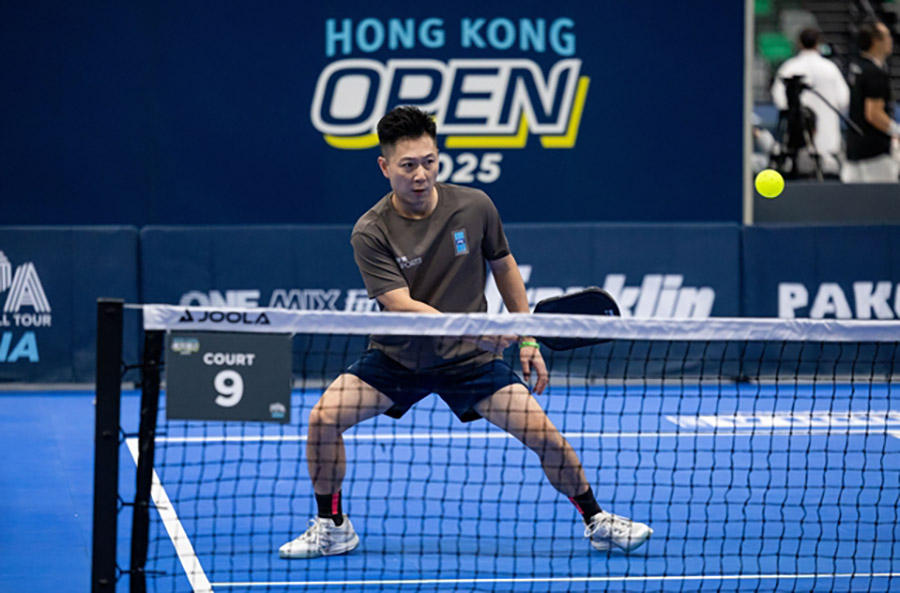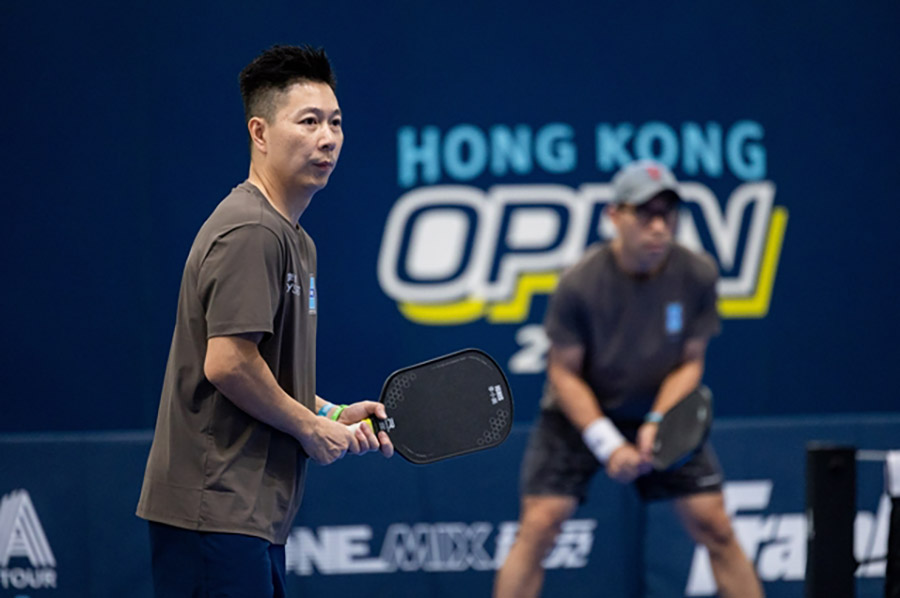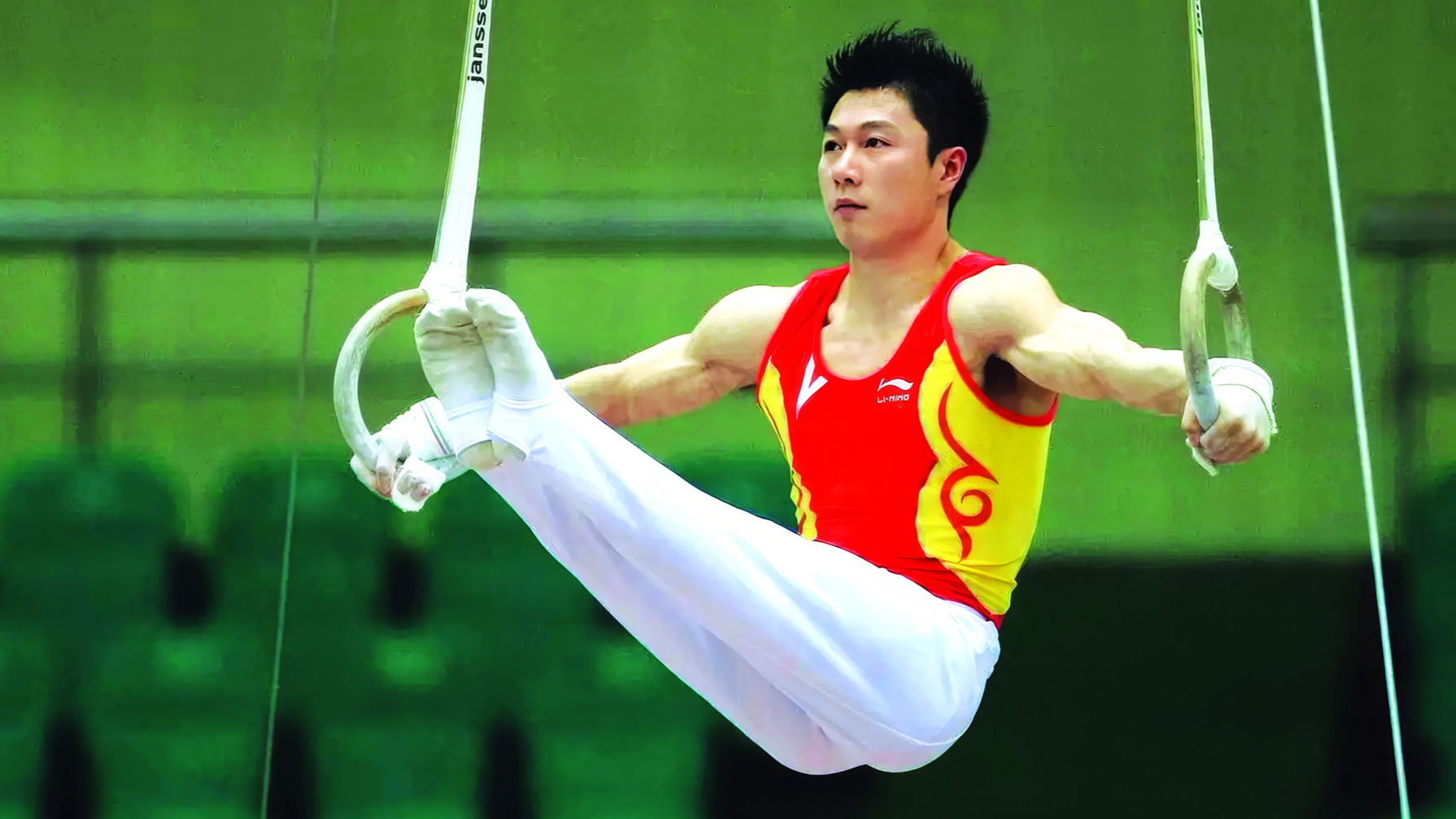Hong Kong has come a long way breeding generations of history-making athletes, enabling the city to open a pivotal chapter in the sporting world. Lu Wanqing reports.

Editor’s note: The future belongs to those who dare to shape it. In this series, China Daily highlights the bold thinkers and doers who are transforming industries and breaking barriers. Meet Li Xiaopeng, who is reinventing himself as a sports entrepreneur in Hong Kong, inspiring the next generation and building bridges between communities through athletic innovation.
Fate has its way of weaving stories full circle, and the twin tale of Chinese mainland gymnastics icon Li Xiaopeng and Hong Kong’s sporting world — that of parallel beginnings that turn into a shared ascent — stands among its most masterful, if quietly told, compositions.
It all began in 1997 when 16-year-old Li debuted at the 8th National Games in Shanghai, as did fittingly, the delegation from the Hong Kong Special Administrative Region.
Thirteen years later in 2010 — a year after retiring from sports — Li used Hong Kong as the launchpad for his second act in business. Another 15 years on — this month — Hong Kong is set to co-host the 15th National Games with the Macao SAR and Guangdong province for the first time in the nation’s sports history.
READ MORE: HK’s hometown carnival to return with delicacies, sports and tech
In the three decades since that kismet beginning, Li and Hong Kong have traced a stunning parallel rise.
The 1997 National Games saw the young phenom seize his first high-profile individual gold in the floor exercise, while Hong Kong’s cyclists too clinched the city’s first-ever gold at the sporting gala.
In 2019, Li entered the International Gymnastics Hall of Fame on the strength of his five Olympic and 11 World Championship medals. Hong Kong, in turn, has bred generations of history-making athletes, most recently with a record-shattering two-gold, two-bronze haul at last year’s Paris Olympics, as well as a buoyant sports ecosystem.

Shaping new paths
Indeed, it was upon Li’s relocation to the city that his story with Hong Kong entered a pivotal chapter.
Hong Kong was the opening gambit in Li’s post-sports master life plan. Although determined to stay rooted in the sporting world, he has always held onto his childhood entrepreneurial aspirations. Starting a sports business, therefore, emerged as an apparent way forward.
The former elite athlete also aims to put his legacy to work, channeling his champion’s aura to inspire the next generation and get more people physically active.
For Li, it is a plan that demands two essential elements — an earnest sporting zeal, and rich commercial opportunities. He sees Hong Kong as the one place ticking both boxes.
Unlike their Chinese mainland peers who are spotted and cultivated with a national-level endeavor, athletes reared under Hong Kong’s elite sports system must rely more on raw self-motivation, often investing personal resources to advance their early careers, says Li, and these are the qualities he has been looking for.
Adding teeth to that is Hong Kong’s long-entrenched reputation as a global financial center. “The city provides great professional support for business and brand development at a level unmatched elsewhere,” he says.
Recent years have seen the SAR doubling down on casting itself as a city for sports, adds Li, citing a rising generation of elite athletes, specialized sports and event businesses, new, modern facilities setting the stage for grass-roots enthusiasts, and deepening regional integration that renders cross-border collaboration a new norm across the Guangdong-Hong Kong-Macao Greater Bay Area.
Cashing in on the favorable climate, Li quickly launched a Hong Kong-based sports venture, got himself involved in managing athletes and hosting events, forged closer ties with the Gymnastics Association of Hong Kong, China, founded a gymnastics club for young gymnastics lovers, and has played a key role in sports exchanges between Hong Kong and the mainland.
After making a serendipitous discovery of pickleball, he saw the city as a fertile ground for emerging sports, and he now propels its popularity within the city and the region.
Today, 15 years on as a mainland newcomer in Hong Kong, Li told China Daily this pivotal move has met his expectations well, and he is itching to see more of the city’s buoyant sports scene as an industry insider.
He believes Hong Kong, resting on its unique institutional edge of “one country, two systems”, can better harness its dual connectivity with the mainland and the world to deepen sports collaboration with both sides in cultivating elite athletes and the industry.
This year’s back-to-back national sports spectacles have allowed Li a glimpse of Hong Kong’s future as an integral part of a “healthy bay area”.
The 15th National Games will be held from Nov 9 to 21, followed by December’s 12th National Games for Persons with Disabilities and the 9th National Special Olympic Games.
Shaped by 20 more years in sports, Li sees the National Games primarily as a rare, invaluable platform for the country’s top athletes to compete, exchange and connect. “For athletes, exchange remains the ultimate catalyst for growth”, he says, and the National Games “showcase the best of the country’s regional athletic prowess — a golden opportunity for observation and mutual learning whereby athletes can identify gaps in their own performance and insights from others”.
Mutual learning extends beyond technical skills. He notes that a State-run cultivation system on the mainland and Hong Kong’s relatively decentralized, market-oriented approach can produce athletes with distinct qualities that might be mutually inspirational for both sides.
Hong Kong’s strong emphasis on sports-commercial integration has helped to create abundant sponsorship and endorsement opportunities for athletes, opening up diverse career paths and star power to inspire future generations, says Li. “It’s a valuable model for athletes elsewhere working to craft long-term careers.”
For this year’s National Games, Hong Kong has assembled a record 1,800-member delegation, joined by 602 athletes, 270 team officials and medical personnel, and 762 nonprofessional participants in 23 mass events.
Having stepped out of an athlete’s shoes and into the backstage as an event organizer, Li sees the event’s unprecedented co-hosting by Guangdong, Hong Kong and Macao as a national vote of confidence in the region’s event-hosting capabilities, and a catalyst for greater alignment of infrastructure and professionals.
Having witnessed Hong Kong’s substantial investment in new facilities, Li is convinced Hong Kong has the resolve to deliver, not just as one of the National Games’ hosts, but also as a global event hub in the making.
In June, Li experienced the Kai Tak Sports Park firsthand at a concert. “The arena is stunning and brilliantly multi-functional,” he observes. “While it’ll definitely elevate sports, it’s also truly a multi-purpose venue for major events.”
The complex — Hong Kong’s new flagship precinct with a 50,000-seat main stadium, a 10,000-seat indoor arena and a 5,000-seat youth sports ground — will stage the fencing, men’s handball and rugby sevens events at the National Games, along with its mass bowling event.
On managing talent, Li says gathering experience calls for considerable professionalism. “Athletes harbor a signal-minded focus on performance, yet organizers face a trickier reality — venues, constant logistical changes, knotty details scattering everywhere, and meeting 80 to 90 percent of planned goals often counts as major success,” he says. “And, Hong Kong has a good pool of professionals.”
He now belongs to Hong Kong’s expanding sports sector workforce. HKSAR government data shows that employment in sports and related activities grew from 75,000 in 2020 to 84,000 in 2023, with its share of total employment rising from 2 to 2.3 percent during the same time frame.
The National Games will also be flanked by Hong Kong’s largest volunteer corps ever, with over 16,000 people filling roles from guest reception to anti-doping support.

Driving sports growth
Behind this impressive mobilization lies Hong Kong people’s authentic, grass-roots ardor for sports, making the city a perfect incubator for emerging sports, says Li.
His own story with pickleball proves this potential. What began as a dabbling at the sport in the United States has grown into one of his most dedicated vocations in Hong Kong. He is committed to making a bigger play for the sport in the city and the region.
Pickleball, born in the US in 1965, is played on a badminton-sized court with a net a few centimeters lower than that of tennis. Players wield oversized table tennis paddles to volley lightweight plastic balls similar in size to tennis balls.
It was a players’ queue of childish joys that captivated Li’s interest in trying out the sport in December 2023 at a Los Angeles public court. “People just lined up their paddles in a rack, waiting for their turn — like back when we played marbles as kids,” he recalls.
To this day, Li still laughs at how “he got thoroughly beaten” by a silver-haired lady in her fifties in his first game, but it was the same humbling defeat that sealed his fascination with pickleball.
“It’s immediately fun with easy-to-learn rules. The game’s modest physical demands are friendly to a wide range of ages and physical conditions, and it has a venue that’s just the right size to blend social interaction with competitive excitement.”
On his return to Hong Kong, Li was pleasantly surprised to find a thriving pickleball ecosystem already in place — dedicated courts, qualified coaches and even the Pickleball Association of Hong Kong, China — to steer the sport’s development.
Promptly, he linked up with the association, became its full-throated public ambassador, and led local community and campus promotion efforts while making use of his cross-boundary links to elevate the sport to prominence on the mainland.
ALSO READ: Australian Open to provide platform for pickleball from 2025
In August this year when the prestigious Professional Pickleball Association Tour made its Asian debut, with one stop at Kai Tak Sports Park, Li partook in a celebrity showcase and teamed up with his Hong Kong coach in an amateur men’s doubles draw.
These days, Li cherishes most his first encounters with new players on the 6-plus-13-meter pickleball court. “It’s the closeness and those chats about nothing that I truly value … that profound social connection and warmth you feel during the games.”
There’s something striking too, but deeply comforting, about the gymnast — a lone wolf who had spent 20 years in arenas of “pin-drop silence”, now divulging fondness for the ballyhoo of community sports.
It turns out that where Li’s passion for gymnastics was once tinged with the strain of towering expectations and the relentless pursuit of gold after gold, Hong Kong has given back to him what he missed most about being part of the sports world — that purest joy of being active and the simplest warmth of being linked.
Contact the writer at wanqing@chinadailyhk.com



